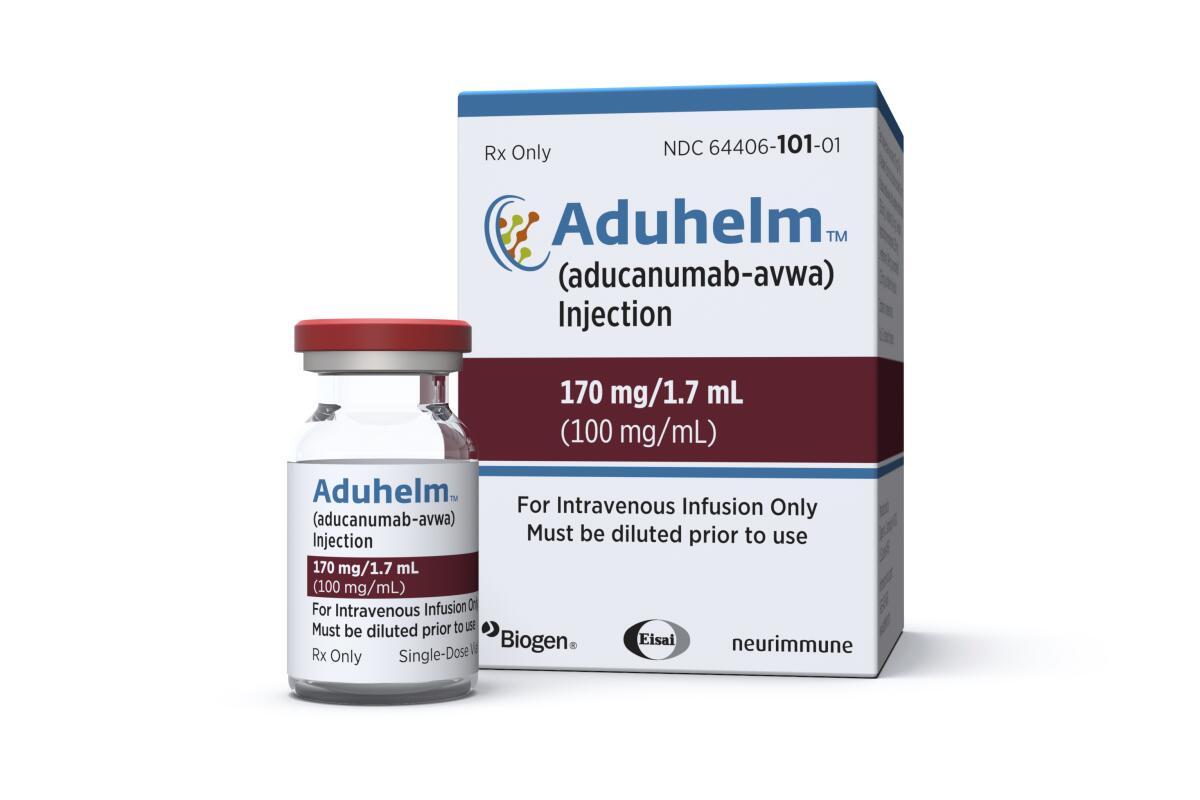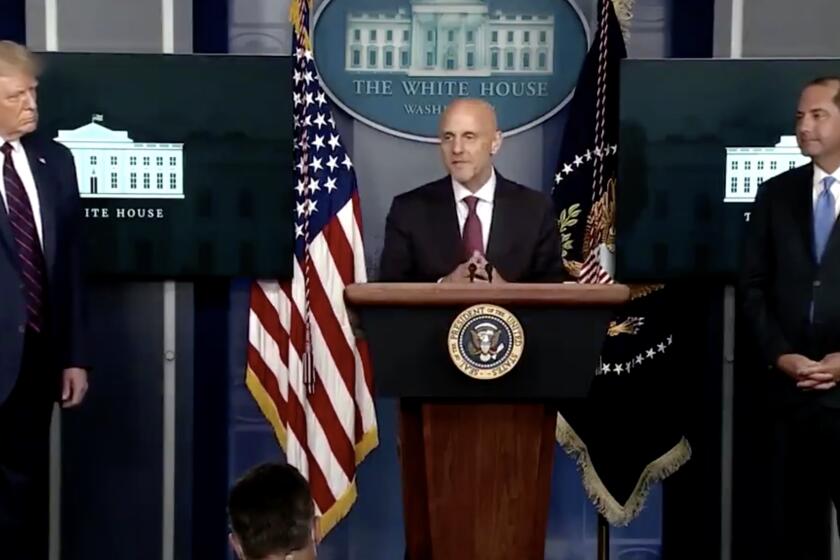Column: The FDA’s hasty approval of an unproven Alzheimer’s drug is bad news for everyone

Call it a landmark, call it a breakthrough: There’s no disputing that the Food and Drug Administration’s approval on Monday of a purported new Alzheimer’s treatment called Aduhelm marked a significant change in the process of bringing new drugs to market.
But it’s a discouraging change. The FDA’s action points to a broken drug approval system. And the way Biogen, the Cambridge, Mass., company behind the drug, responded to the approval points to the immense flaws in America’s drug-pricing methods.
Here are the problems in a nutshell: Medical experts’ doubts about whether Aduhelm works at all should have stayed the FDA’s hand in issuing its approval. Despite the experts’ doubts, however, the FDA went ahead, effectively giving Biogen the green light to set the drug’s price at $56,000 a year.
If we wait for the perfect drug or perfect data, we will descend further into the grip of this awful disease. People staring into the abyss of Alzheimer’s deserve no less.
— George Vradenburg, chairman of Us Against Alzheimer’s
That’s about twice as much as financial analysts expected, and a level that’s almost certain to limit patients’ access to the treatment while imposing a heavy financial burden on the public programs and private insurers who will be asked to pay for it.
The FDA took its action under its “accelerated approval” rules, which allow for approval of a drug before all conclusive evidence has been submitted. The agency said it would require Biogen to conduct another clinical trail to verify the drug’s benefit, and if that trial fails, it might seek to take the drug off the market.
Get the latest from Michael Hiltzik
Commentary on economics and more from a Pulitzer Prize winner.
You may occasionally receive promotional content from the Los Angeles Times.
The FDA’s move to resort to accelerated approval itself came under fire. “Accelerated Approval is not supposed to be the backup that you use when your clinical trial data are not good enough for regular approval,” tweeted Aaron Kesselheim of Harvard Medical School, who was a member of an FDA panel that rejected the drug.
Kesselheim has resigned from the panel, calling the FDA’s action “probably the worst drug approval decision in recent U.S. history” in his resignation letter to the agency. Two other members of the FDA panel have also resigned in the wake of the approval.
After the approval, Biogen executives figuratively rubbed their hands in glee at the potential sales and profits lying ahead. “We believe Aduhelm represents a significant long-term growth driver with modest revenue in 2021 ramping to a multibillion-dollar U.S. sales opportunity over the next several years,” Chief Financial Officer Michael McDonnell told Wall Street analysts the very next day.
The agency’s announcement drove the company’s stock price nearly 40% higher on Tuesday, to $395.85; the shares have risen by more than 6% in the ensuing days.
It’s not hard to understand the pressure on the FDA to approve Aduhelm. Alzheimer’s devastates not only its patients — 6.2 million in the U.S. alone — but imposes an unendurable emotional and financial burden on their households. The prospect is great that millions more will be swept up in this crisis in coming decades as the nation ages. There is no cure, no means of prevention, and the effects of the few remedies now on the market are inconclusive and modest at best.
Those factors weighed heavily on the approval process. Alzheimer’s patient advocates argued, in effect, that the implacability of the disease and the desperation to identify a treatment should transcend questions about the drug’s efficacy.
“If we wait for the perfect drug or perfect data, we will descend further into the grip of this awful disease,” George Vradenburg, a former corporate lawyer who founded and chairs the advocacy group Us Against Alzheimer’s, said after the FDA’s action. “People staring into the abyss of Alzheimer’s deserve no less.”
This is not the first time that the promotion of a potential treatment for Alzheimer’s has resembled clutching at straws. California’s stem cell program, known formally as the California Institute for Regenerative Medicine, fell into the same trap in 2012, when its governing board approved $19.3 million in funding for an experimental treatment that was to be tested on mice.
A biotech firm has halted work on a state-funded disease cure, purely for its bottom line.
I reported at the time that the funding was based on an application that had been repeatedly rejected by CIRM’s scientific review panel, largely because the reviewing experts considered the data supporting the application less than “compelling.”
The applicant was the very well connected firm StemCells Inc., which was supported in its quest by the Northern California real estate man Robert Klein II, who had drafted Proposition 71, the ballot measure that created CIRM, and served as the program’s first chairman. But the fundamental rationale for the approval was that the larder of potential treatments for Alzheimer’s was otherwise bare.
“Everybody says it’s a huge unmet need,” Leeza Gibbons, a former television personality placed on the CIRM board as an advocate for Alzheimer’s patients, said at a board meeting in July 2012. “This is a sixth-leading cause of death, the only one in the top 10 for which there is nothing, nothing, nothing, zilch.”
As it happens, the company ended the research program in 2014, after spending $8.9 million of its grant and “without seeing a significant change in memory performance” among the test animals. The company returned $679,166 to CIRM after abandoning the project; the $10.4-million balance of the grant had never been disbursed and was redirected to other recipients.
Let’s take a closer look at Aduhelm’s journey to approval.
Aduhelm, which is known formally as aducanumab, is evidently effective at clearing the accumulation of beta amyloid protein from the brain. That’s considered promising because the accumulation of the protein is associated with Alzheimer’s.
With high drug prices still in the political crosshairs on Capitol Hill, pharmaceutical industry bosses are at pains to explain why a cure for hepatitis-C has to cost a budget-busting $1,000 per pill, or a promising cancer treatment should carry a list price of $373,000.
But clinical trials of the drug didn’t show that it was effective in actually slowing the course of the disease. In March 2019, Biogen and its Japanese research partner, Eisai Co., halted those trials because they didn’t show a slowing of cognitive decline in the trial subjects. A few months later, however, the companies resurrected the drug, asserting that new analyses of the trial data showed that it was indeed effective.
Many Alzheimer’s experts, including a majority of members of an FDA advisory panel, remained unconvinced, however.
“The evidence that aducanumab ... has any benefits in persons with AD [Alzheimer’s disease] is terribly weak,” neurologist David Knopman of the Mayo Clinic stated ahead of a key panel meeting last Nov. 6. “Four years from now, it is very unlikely that any Alzheimer patient will genuinely be better off as a result of aducanumab — at best slightly less worse, but no better.”
Knopman added in his statement filed with the FDA, “Perfection may be the enemy of the good, but for aducanumab, the evidence doesn’t even rise to ‘good.’ Contrary to the hope that aducanumab will help Alzheimer patients, the evidence shows it will offer improvement to none, it will harm some of those exposed, and it will consume enormous resources.” Knopman, who was a member of the advisory panel at the time of the Nov. 6 meeting, resigned after the FDA’s approval.
The 11 expert panelists assembled for the November meeting overwhelmingly opposed FDA approval of the drug, rejecting Biogen’s evidence in three key votes. Some questioned how the drug companies had conducted their analysis.
“There are enough red flags in terms of the changes to the protocol, concerns about unblinding and the observation of efficacy in the final 78-week analysis without a full cohort of patients being able to contribute to that analysis [that] doesn’t add up to a strong evidence,” Kesselheim said.
There were also concerns that approving a treatment that proves to be ineffective would set back the search for Alzheimer therapies. “If we approve something where the data is not strong, we have a risk of delaying good therapies and effective therapies for more than a couple of years, for many years,” said Joel S. Perlmutter of Washington University in St. Louis. “There is a huge danger in approving something that turns out not to be effective.” Perlmutter has also resigned from the advisory panel.
Biogen’s corporate interest in FDA approval for its new drug is obvious. The company, which recorded $4 billion in profit on $13.4 billion in revenue last year, is losing its grip on two of its leading drugs. Spinraza, a treatment for neuromuscular disorders, is facing competition from a new drug introduced by Roche, and Tecfidera, a multiple sclerosis drug, is subject to competition from generics reaching the market at lower prices than its brand-name version.
These developments cut Biogen’s product revenue by nearly $700 million last year compared with 2019, with more declines on the horizon. As a result, FDA approval of Aduhelm became the company’s “highest priority,” Chief Executive Michel Vounatsos told investment analysts last October.
Trump attacks the Food and Drug Administration and undermines its science while its leadership stays silent.
Vounatsos said the company’s decision to price the drug at an average of $56,000 a year was partly based on its “value proposition” — that is, its potential to reduce the financial burden of Alzheimer’s on society and healthcare payers, which is estimated at $600 billion a year.
“What would happen if you have a treatment that might have a meaningful impact on the total cost?” Chirfi Guindo, the company’s product strategist, told analysts after the approval. “That’s kind of how we would like to frame the conversation.”
Guindo added that Biogen looked at prices charged for other specialty drugs, such as chemotherapy and psoriasis drugs, which often command five- or even six-figure annual prices. “We have priced Aduhelm at roughly one-third the level of the cancer immunotherapies and roughly 25% below the average level of psoriasis biologics,” he said. “So we consider this to be a really responsible price.”
But the executives also acknowledged that the vast majority of the drug’s patients are older than 65 and therefore will be covered by Medicare, which is required to provide patients with FDA-approved drugs and has limited authority to negotiate prices.
If 1 million patients receive the treatment, the overall cost could exceed $50 billion. That might be cost-effective if Aduhelm materially improved the outcomes for patients, but the clinical evidence for that result is questionable. Medicare patients pay about 20% of the cost of their drugs, with no cap, so some of the burden of Aduhelm’s price will fall on them. It’s possible, even likely, that insurers and other payers will try to moderate the financial impact of the drug by excluding some categories of Alzheimer’s patients from the treatment.
Questions about the price quickly rained on the party Biogen was throwing for itself for gaining rare approval for an Alzheimer’s drug.
“I know it’s months and months of hard work and congrats again on that,” Umer Raffat, an analyst for Evercore ISI, said during the post-approval conference call. But he added, “I do think there’s a disconnect between some of the words that you’ve shared in your press releases like ‘responsibility,’ ‘access,’ ‘health equity,’ versus the price point.”
Vounatsos replied, “We believe that the price is substantiated by the value it is expected to bring to patients, caregivers and society.”
More to Read
Get the latest from Michael Hiltzik
Commentary on economics and more from a Pulitzer Prize winner.
You may occasionally receive promotional content from the Los Angeles Times.













